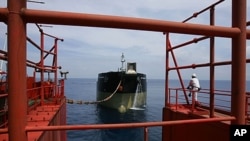Liberia is still years away from tapping what African Petroleum calls a significant oil deposit off the country's coast. But as the company assesses deposits for commercial viability, some Liberians are meeting the recent discovery with cautious enthusiasm, wondering if their fragile West African nation can avoid the so-called resource curse.
Randolph McClain heads Liberia's national oil company, known by its acronym NOCAL, which is also involved in the project. He says it will be months before they know whether the quality and quantity of the discovery is commercially viable.
"I'm sure you will share our hope and confidence that this could be the first step in a flourishing oil sector for Liberia," he says.
According to the U.S. Geological Survey, the potential is there. Liberia, Sierra Leone and Ghana, the organization says, are sitting on as much as 3.2 billion barrels of offshore crude.
A rush on natural resources
After more than a decade of bloody conflicts, newfound stability has prompted a rush on not only oil, but also other regional natural resources like gold and iron ore.
Ghana pumped its first barrels of crude oil for the world market in late 2010, three years after its discovery. Government officials in Accra say Jubilee Oil Field earned almost $450 million in the first year, and experts say annual revenues could reach as much as $1 billion per year, which, managed wisely, could fuel development and greatly reduce dependence on foreign aid.
But Liberians like Monrovia resident Jerry Lamie remain apprehensive of oil wealth.
"A lot of times people take advantage of the fact that whatever revenue is generated from the oil industry is not being decentralized," he says. "So you have few getting richer and the rest of the country suffers."
Liberia's state-owned oil company, NOCAL, is at the heart of debate.
Global Witness, an international watchdog group, has recommended outfit be disbanded.
"The biggest concern probably is a series of bribes that were paid," says Jonathan Gant, the organization's Liberia policy adviser. "The Liberian government has referred to them as lobbying fees, but they were monies paid mostly by the national company itself to the Liberian legislature to facilitate the passage of different oil contracts. We don't have any evidence that this sort of behavior has occurred in the last several years, but until there are obvious reforms - both of the law by which the contracts are administered and of these financial processes - it's pretty unclear to see why the same thing couldn't happen again."
Current laws make NOCAL both a commercial, profit-driven enterprise, as well as the regulatory body in charge of the oil sector.
Director of the Center for Transparency and Accountability in Monrovia, Thomas Nah, says the situation constitutes a serious conflict of interest.
"If you look at some of the laws, they are both player and referee at the same time," says Nah. "They are playing and refereeing at the same time because they are supposed to be participating and, at the same time, they are supposed to be regulating and then, to some extent, involved in policy-making."
For their part, NOCAL officials say urgently-needed reforms to existing oil legislation are under way and that the company supports greater transparency with regards to how revenue is to be managed.
Security concerns
In Nigeria, a regional petroleum giant, militants demanding a more equitable distribution of oil wealth have recently resumed attacks, a red flag to Monrovia resident George Moore, who says security is another key concern about the prospect of an oil-rich Liberia.
"We talk about countries that are responsible to produce oil and we find a lot of conflict there," says Moore. "Oil fighters are responsible for this. These conflicts are the result of the production of oil in these countries. Because of this we find that things have been destabilized in a country when it comes to infrastructure and development."
Liberia itself emerged from a brutal 14-year civil war in 2003 that was funded in part by natural-resource revenues; warlord-turned-president Charles Taylor traded logging concessions for guns and paid his soldiers in timber money.
Liberian President Ellen Johnson Sirleaf has pledged to establish polices that would ensure oil revenues are for the "good of the country and the good of all people."
Liberians, however, say they will wait and see.
News
Liberians Cautiously Optimistic About Oil Prospects
- By Anne Look




